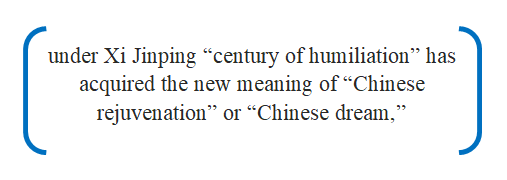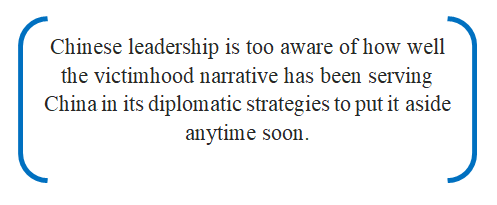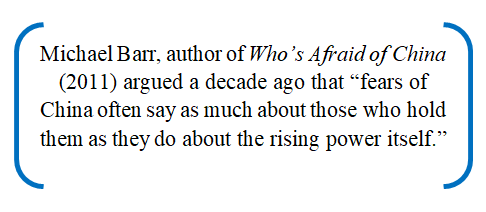Hemant Adlakha, Honorary Fellow, ICS

Source: newyorker.com
Much before Trump-Pompeo combined “assault” on China and its ruling communist party, an article penned by a Singapore-based US researcher in Asia Times five years ago accused the communist party leadership of China of taking “victimhood” card to dizzying heights. Richard A. Bitzinger, the author, further claimed “every nation in the Asia-Pacific can claim, with some justification, to be a victim. Even Japan can declare its victimhood, as it was the first (and so far, only) target of nuclear weapons.” A well-known and globally respected scholar in South Korea wrote a decade ago: “the global community must speak with one voice and send China a clear message that it no longer views China as a victim of modern history.”
To most Chinese, including of course the ruling communist party, the above Western narrative demonstrates “the ignorance and prejudice its creators” have long held towards China. However, what Bitzinger and the South Korean professor Jongsoo Lee have been emphatically pointing out over the past decade or so is something new: it’s time China must shed a “victim” mentality. The Western “irritation”, as well as “impatience” with China playing victimhood or “century of humiliation” card, had started following China’s unprecedented economic rise a couple of decades ago. More recently, the worldwide anti-Chinese victim mentality buzz, which was re-launched half a decade ago with China’s “aggression” and “assertiveness” in the South China Sea, reached a crescendo with the global spread of the Covid19 pandemic.

Source: Cambridge.org
This explains why according to the Western narrative, in recent years China’s acute sense of “victimhood” has been more pronounced in the international political arena. In June 2016, as the legal verdict was being awaited on China’s sweeping claims to SCS, the WSJ published a story entitled “The Danger of China’s Victim Mentality” and warned the international community of “Beijing lashing out if a ruling on SCS claims goes against it.” Suddenly, the global media was filled with similar “China against the world” op-ed commentaries. While some genuinely advised China to stop its obsession of playing the victim if the country seriously wished to advance as a society. Others were less charitable and warned China must shed a “victim” mentality.

At another level, as according to Mark Tischler, a researcher at the Department of East Asian Studies, Tel Aviv University, the fundamental flaw in the Western narrative is, it often overlooks the fact that “China is the first power to challenge the United States” that truly rose from its post-colonial past. (Emphasis added) Perhaps oblivious of how much of China’s modern-day policy is driven by the collective trauma of “victimhood,” a former Indian foreign secretary opined recently “to avenge the ‘Century of Humiliation’ that China endured in the hands of western imperial powers from roughly 1839-1840 to 1949,” the Chinese are pursuing unilateralism instead of compromise in SCS. Moreover, their new brand of “wolf warrior” arrogance is replacing diplomacy of humility of the Zhou Enlai-Deng Xiaoping style, observed the veteran Indian diplomat who also served as ambassador in Beijing. In contrast, Tischler argues the major difference between Beijing’s and Western narrative on “century of humiliation” is the following. For China, it (century of humiliation) means “not just a grim lesson of the past, but also a warning about a possible future.” Hence, the (Chinese) narrative has created “a never again mentality.”

Much has been written and published in both Chinese and in English, on China’s victim mentality. Yet the issue has not only not whittled away over the decades since the foundation of New China, instead under Xi Jinping “century of humiliation” has acquired the new meaning of “Chinese rejuvenation” or “Chinese dream,” as it were. Interestingly, in an attempt to twist the “one hundred years of humiliation” narrative into post-Mao or post-Tiananmen Chinese nationalism, some scholars in the West are calling it anti-Western or anti-US Chinese nationalism. Applauding Zheng Wang’s highly acclaimed (Columbia University Press, 2014) Never Forget National Humiliation: Historical Memory in Chinese Politics and Foreign Relations, Edward Friedman described the work as “a vivid and well-informed study of post-Mao nationalism and Chinese foreign policy…”

Furthermore, it is not incorrect to say scholarly claims of “victimhood” being described as the new Chinese fig leaf for anti-West nationalism and to create post-Mao/pre-Mao “victimhood” dichotomy – as the current Western narrative wants us to believe, are fundamentally flawed. A recent article, for example, accuses the Communist Party of China (CPC) of manipulating the so-called victimhood as nothing less than a cynical ploy to exploit Chinese history and the feelings of Chinese people. It is pertinent to mention, though intangible, such a narrative has been receiving a lot of traction in the international media recently. Consider for example some of the following popular writings: “China doesn’t have to keep playing the victim” in Foreign Policy (2018), “China playing victim after attacking Indian soldiers in Galwan” in theprint.in (2020), “The Danger of China’s Victim Mentality” in TWSJ (2016), “China’s dangerous sense of entitled victimhood” in Asia Times (2016), “China’s New Diplomacy: Victim No More” in Foreign Affairs (2003) and so on.

Source: openthemagazine.com
Though perhaps understudied in the West, like most intellectuals in the late Qing and Republican eras, Mao Zedong too was not only deeply disturbed by the Chinese “century of humiliation,” several of his foreign policy decisions in the early to mid-1950s were heavily influenced by the “victim” mentality. In a seminal paper jointly authored by China’s widely respected historian, professor Yang Kuisong, and his young protégé and a Ph.D. candidate in Chinese history at the Pennsylvania University, Sheng Mao, have highlighted how Mao’s victim mentality impacted his decision which led to two Taiwan Strait crises in 1954-1955 and 1958 respectively. From both crises, according to Yang and Sheng, Mao’s gains were remarkably rewarding and psychologically productive. The first Taiwan Strait crisis – the shelling of Jinmen in 1954 – resulted in Mao succeeding in “forcing the United States to begin ambassador-level talks with China.” The outcome of the second Taiwan crisis in 1958 enabled Mao to declare: “The United States has put itself into our noose.” “The other thing Mao claimed to have achieved from the crises was confirmation of America’s nature as ‘paper tiger’,” Yang and Sheng pointed out.

Finally, as we talk of prejudice and victimhood, and as the scholars in the West have firmed up their resolve to force Beijing to “give up” playing “victim” card, one thing is crystal clear in the minds of the current party leadership, i.e., riding on the past success of Mao’s playing “victim” mentality, the current Chinese leadership is too aware of how well the victimhood narrative has been serving China in its diplomatic strategies to put it aside anytime soon. Analyzing how China’s victimhood strategy was on full display at the Anchorage summit in Alaska two months ago, Drew Thompson, a visiting senior research fellow at the National University of Singapore, views the Chinese “victim” mentality narrative aimed more at the domestic audience than at the world populace at large.

Source: South China Morning Post
Well, speaking of prejudices and biases, Michael Barr, author of Who’s Afraid of China (2011) argued a decade ago that “fears of China often say as much about those who hold them as they do about the rising power itself.” The book has been described as holding a mirror to Sino-Western relations in order to better understand ideas about modernity, history, and international relations. It is indeed true the Western bias against China predates the “century of humiliation.” What is also historically undeniable is “on no other major civilization do self-regard, self-congratulation and denigration of the ‘Other’ run as deep, as they have in Western Europe and its overseas extensions,” observed a professor of economic history in a recent article “A Eurocentric Problem.” Not at all a surprise, historian Jeffery Wasserstrom wrote in his review of the book above: “This short book provides a clear-eyed critique of the latest versions of Sinomania and Sinophobia.”

In conclusion, as mentioned above, not only China is not going to stop playing victim and behave like a “normal country” as was recently on display during the first top level bilateral summit between the world’s two largest, hostile economies since President Biden took office. On the contrary, as many in the West fear, and as Beijing perceives the US power as well as dominance continuously declining, China is likely to pursue expansionist policies unchecked. Unlike what many in the West see as the nature of Chinese diplomacy is changing, China knows it is pursuing the same Maoist strategy to trap the US in the Chinese noose. As regards the “wolf warriors,” a seasoned Chinese ambassador Liu Xiaoming, flaunting “victimhood,” recently offered a tongue-in-cheek explanation: where there is a “wolf”, there is a “warrior”.
*This is a slightly edited version of the article published under the title Of Prejudice and Victimhood. https://moderndiplomacy.eu/2021/05/18/of-prejudice-and-victimhood/